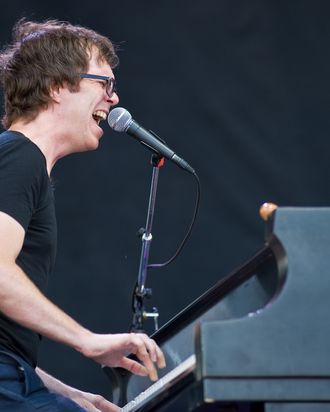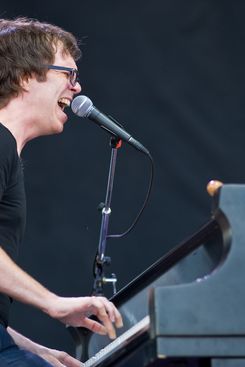Photo: Timothy Hiatt/2011 Timothy Hiatt
In the mid-nineties, Ben Folds broke through (with his original trio, the Ben Folds Five) as a hyperliterate, smirky songwriter and pianist, and he has ended up a prolific, diverse solo artist and producer with a reality-TV a cappella judging gig. And in between all that he’s experienced mainstream success, inevitable backlash, and alternating odd and respectful looks for his choice of collaborators, from William Shatner to Nick Hornby. Folds has just released a three-CD career retrospective, The Best Imitation of Myself, so we decided to ask the always unfiltered Folds to track the highs and lows of his career.
Related: Switcheroo: Nick Hornby Picks His Favorite Music, and Ben Folds Picks His Favorite Books
Watch Bob Saget and Ben Folds Sing a Dr. Dre Duet
“Well, there were a few different moments. I remember being in my band just post college and making a little name for ourselves down South, and because I’d never experienced any kind of recognition before, that felt like, Wow, we’re fuckin’ famous. And then later on, when Ben Folds Five started really making a buzz, and it was pretty quick; we got from where we weren’t [famous] to where we were really fast. I remember being pushed through Brownie’s, this East Village quasi-punk-rock club in New York, when a little bit of the mania part of a career had begun. Even though we didn’t have a big record yet, it just felt like it was all happening; I remember there were two dudes on either side of me pushing through the crowd, it was nutty. The next time I remember it being obvious was in Australia with Ben Folds Five, probably at the beginning of the Whatever and Ever Amen phase; ‘Brick’ was just becoming a hit there, and I remember being in the middle of the street outside after a show, being just packed in, signing [autographs], and realizing I had to take a deep breath and sign my way out of it. I remember thinking it was scary and bizarre, and I was kinda not in a great place then anyway, thinking, God, this is fucking weird. Just being so closed in that it was like being in the middle of a packed train, just physically not being able to get out. I just left and was like, Holy shit.”
Photo: Ebet Roberts
“There’s a stigma about you once you leave a group and go solo: You have about two seconds to have a massive hit, and if you don’t you’re washed up in the eyes of the system. I felt like I was taking off, but the system viewed it like I was done. But I make a better living and don’t have to do as much ass kissing now. I knew I had to do it, and I’m really good about following my instincts when it comes to my career — in my regular life, maybe not so much. It takes some guts, especially when I really went solo, touring with the solo piano; I was scared to do it and I was told it was a really bad idea commercially. But it so paid off musically and every other way. All the things I’ve been able to do — working with Rufus Wainwright, Regina Spektor, William Shatner — I couldn’t have done in the band. We were codependent in defining what we did and that didn’t allow me to go out and do other things that I wanted to do. So I had to decide: I’m okay with maybe not being commercially successful, and I’m leaving. I was really leaving for freedom, the reason you leave any relationship. And the guys were fine with it, too; they had things they wanted to do. To be defined by two other people you didn’t know a year ago, we all had different things and lives.”
“Insecurity in your art and self are horrible demons. And when I quit the band and went solo, that was scary. I just had twins, after having been ‘rock band dude,’ and I worried that I was entering a way too grown-up phase and was going to be cast aside. Then [my first solo album, Rockin’ the Suburbs,] was released on 9/11, and I can’t complain about what happened, but it crushed the record commercially. It got some good reviews, but it was the beginning of the era that continues now of people going real personal when they don’t like my records. I’ve kind of gotten to a place where I can say [about a writer who keeps slamming me], ‘Oh that fuckin’ joke again, he’s still around?’ And that it means you’re actually still around and relevant. But that was a pretty low time. Another time was, ironically, upon the release of my highest charting solo record, Way to Normal. I had a rough personal time, made a record that had a certain kind of humor in it, went with a producer who contributed to a distorted sound which made it sound a bit more bitter, and I felt bad — l felt it was being misunderstood. Magazines I’d respected growing up like Rolling Stone were jumping out and saying I was the angriest guy in show business and somebody better take this guy out now. And I just felt like, yuck. Despite that, the touring of the record was beautiful, it was great. But in my perception I felt like I put out a record that was picking fights.”
“No, I don’t think I’d take satisfaction in that. I’ve always been of the opinion that if you’re a dedicated musician with something to say, there will be a number of determined people who agree with you, that you’re expressing what they would express if they care to spend the time with the music. It’s not your job to turn heads. Sometimes people are in a place where they’re not ready to hear something, I’ve been there, like, Aaaah what the fuck is that, and then a year later That speaks to me! but the harder you try to make someone like you, it’s just fuckin’ obnoxious. You stop being yourself, and being yourself is the important thing. Hopefully over the years, the people who were snooty about my music just stopped writing about it.”
Photo: Frederick M. Brown/2011 Getty Images
“The a cappella movement I’ve been in on, no one was up for that shit. And it’s really led to good things. Doing the University A Cappella! record was a great moment; I turned down a shitload of money to do other things and it cost me, and I gave all this money to music education. But I felt I should do it, getting in a van and doing it like a field recording, and it wasn’t successful but it made some money for charity and it also led to The Sing-Off. I took the job because there was nothing about it that seemed fraudulent. At first I wasn’t going to because of what it looked like on paper. Oh, now he’s gonna be a judge on a reality show? What an asshole. But because it’s a cappella, something I’m interested in, listening to them and giving them some encouragement and feedback, I can do that, that’s good. There was something about it that felt like something I do.”
Photo: Lewis Jacobs/? NBCUniversal, Inc.
“I’m in a place where I can take my experience and help other people coming up who want to be musicians, and I do spend a lot of time doing that. The Sing-Off has really been a music education push for me. I never know what’s next; I never know if I’m gonna write anything else good. On paper, not many artists do relevant work at my age. Am I gonna write a big piece of shit album trying to be popular that will suck? I don’t think so. I have to be okay with the possibility that the next things I write at any point just aren’t in the sweet spot. That’s what the greats have faced — Paul McCartney, Bob Dylan — why shouldn’t I? They have to go through that period where people aren’t on the edge of their seats for what they write. For an artist, you have to face that that may be possible, and you just have to keep moving along in the way you do. I have to make sure I’m super proud of the stuff I make. I’m super proud of the Nick Hornby record. Did it do well? It did not. But I’m totally proud of it. If I can keep doing that, I’ll be happy.”
Photo: Timothy Hiatt/2011 Timothy Hiatt




!["Well, there were a few different moments. I remember being in my band just post college and making a little name for ourselves down South, and because I’d never experienced any kind of recognition before, that felt like, Wow, we’re fuckin’ famous. And then later on, when Ben Folds Five started really making a buzz, and it was pretty quick; we got from where we weren’t [famous] to where we were really fast. I remember being pushed through Brownie’s, this East Village quasi-punk-rock club in New York, when a little bit of the mania part of a career had begun. Even though we didn’t have a big record yet, it just felt like it was all happening; I remember there were two dudes on either side of me pushing through the crowd, it was nutty. The next time I remember it being obvious was in Australia with Ben Folds Five, probably at the beginning of the Whatever and Ever Amen phase; 'Brick' was just becoming a hit there, and I remember being in the middle of the street outside after a show, being just packed in, signing [autographs], and realizing I had to take a deep breath and sign my way out of it. I remember thinking it was scary and bizarre, and I was kinda not in a great place then anyway, thinking, God, this is fucking weird. Just being so closed in that it was like being in the middle of a packed train, just physically not being able to get out. I just left and was like, Holy shit."](https://pyxis.nymag.com/v1/imgs/aac/d2b/46eda33c554cb51ef988b58d36ef21cf9d-20111013-benfolds-1.rhorizontal.w700.jpg)

!["Insecurity in your art and self are horrible demons. And when I quit the band and went solo, that was scary. I just had twins, after having been 'rock band dude,' and I worried that I was entering a way too grown-up phase and was going to be cast aside. Then [my first solo album, Rockin' the Suburbs,] was released on 9/11, and I can’t complain about what happened, but it crushed the record commercially. It got some good reviews, but it was the beginning of the era that continues now of people going real personal when they don’t like my records. I’ve kind of gotten to a place where I can say [about a writer who keeps slamming me], 'Oh that fuckin’ joke again, he’s still around?' And that it means you’re actually still around and relevant. But that was a pretty low time. Another time was, ironically, upon the release of my highest charting solo record, Way to Normal. I had a rough personal time, made a record that had a certain kind of humor in it, went with a producer who contributed to a distorted sound which made it sound a bit more bitter, and I felt bad — l felt it was being misunderstood. Magazines I’d respected growing up like Rolling Stone were jumping out and saying I was the angriest guy in show business and somebody better take this guy out now. And I just felt like, yuck. Despite that, the touring of the record was beautiful, it was great. But in my perception I felt like I put out a record that was picking fights."](https://pyxis.nymag.com/v1/imgs/eeb/c84/49ef694c5d8b214cf070a52373f795315c-20111013-benfolds-6.rhorizontal.w700.jpg)





